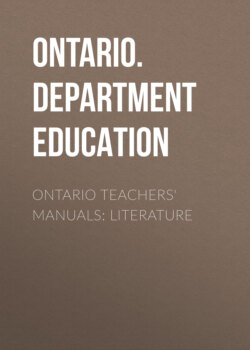Читать книгу Ontario Teachers' Manuals: Literature - Ontario. Department of Education - Страница 20
На сайте Литреса книга снята с продажи.
GENERAL PRINCIPLES APPLICABLE IN THE TEACHING OF LITERATURE
ОглавлениеTable of Contents
There are four outstanding principles of general method that apply particularly in the teaching of Literature.
I. The pupil must, at the outset, be placed in a receptive attitude toward the lesson if the best results are to be secured. He must have some purpose in view if he is to be induced to concentrate his attention upon it. His purposes determine his interests, and hence the lesson must, in some way, be related to interests that already exist in his mind. Frequently his instinctive interest in action, in personality, or in excitement is sufficient incentive to secure his attention. A suspicion that a lesson contains a good story is often sufficient to ensure a careful reading of it, and a curiosity as to the writer's devices to make the story interesting will lead to a closer examination of it. But more frequently some special interest resulting from the time of year, the surroundings, or the work taken in some other subject, may be effectively utilized by the teacher. These interests of children are so numerous and so varied that there are few lessons in the Readers for which a receptive attitude of mind cannot be secured. It will be observed that the principle here enunciated corresponds to the "statement of the aim" in the Herbartian "Formal Steps".
II. The pupil's mind must be suitably prepared for the assimilation of the ideas contained in the lesson, by recalling old ideas and feelings that are related to those to be presented in the selection to be studied. He must be placed in a proper intellectual attitude to interpret the ideas and in a proper emotional attitude to appreciate the feelings. Neglect of the former may make the selection wholly meaningless to the pupil; neglect of the latter may result in entire indifference toward it. A proper intellectual attitude is necessary in any lesson, but in a lesson in grammar or arithmetic the emotional attitude may be almost completely absent. In literature, however, this emotional attitude is often of the greatest importance, and the neglect of it may mean an utter lack of appreciation of some literary masterpiece. This preparatory work may take the form of a recall of some of the common experiences of the pupil's life or a review of some facts taken, for instance, in a previous geography, history, or nature study lesson. The apperceptive power of the pupil's mind takes the new material of thought and feeling contained in the selection and weaves it into the web of his previous ideas and emotions.
III. The mind always proceeds from a vague and indistinct idea of a new presentation to a clear and defined idea of it. The process is always analytic-synthetic. In a literature lesson the order of procedure must be: (1) Let the pupil get that somewhat indistinct grasp of the thought and feeling which comes from a preliminary reading of it; (2) make this more definite by a process of analysis, by concentrating attention on the details; (3) make the idea completely definite by a clear grasp of the relations existing among the various details, that is, by a process of synthesis.
IV. No impression is complete without some form of expression. An idea or emotion is a very incomplete and useless thing until it is worked out in practice and conduct. The thoughts and feelings gained from the literature lesson must be given some kind of expression if they are to be fully realized. This expression may take many different forms. The pupils may merely read the selection, showing to the listeners their understanding and appreciation of it. If it is a story, they may reproduce it in their own words orally or in writing. They may sketch a scene or a situation with pencil, or with brush and colours. They may dramatize it, or act it in pantomime. They may create a story with a similar theme, or imitate a poem by a creation of their own. The expression may not be immediate but may be delayed for days or even years, and come in some modification of future conduct.
